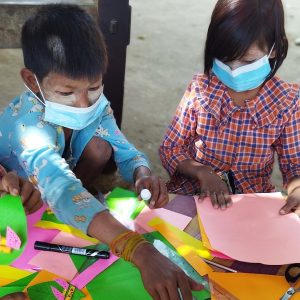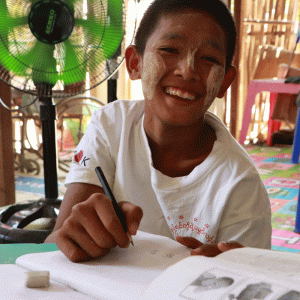Eighteen-year-old Ma Thein*, from Rakhine, was forced to live on one meal a day when Cyclone Mocha hit Myanmar in May.
The teen was one of more than a million people impacted by the disaster, one of the strongest cyclones – with winds up to 250km/h – to ever hit the country.
The cyclone killed nearly 150 people and devastated thousands of homes, schools, and businesses. Ma Thein’s home in Rakhine state – which was already affected by ongoing conflict – was hit hardest.
Ma Thein was living with her sister and working as a casual labourer when the cyclone destroyed their home, a humble thatched hut. Ma Thein and her sister found their expenses rapidly rising, having to pay for everyday living costs such as food, as well as for repairs, with little to no income.
In response to the impact of Cyclone Mocha, ChildFund Myanmar and local partner, Ratana Metta Organization (RMO), have been supporting more than 1,600 households living in poverty with emergency food and hygiene packages. Ma Thein and her sister received food supplies such as rice, beans, and oil, and some hygiene products such as towels, soaps, sanitary pads, tooth paste and tooth brushes.
“We can now save some money to repair our house, pay for health care, and pay off old debts,” Ma Thein said. “I do not have enough words to say thank you.”
*Name has been changed
After a decade of working in Myanmar, ChildFund is taking pause to reflect, celebrate, and look to the future.
“Reaching 10 years of working with children and families in Myanmar is such a significant milestone. We know there is still plenty of work to be done. In the coming years we’ll continue to look at how we can best support children and young people to be safe, healthy, educated and contributing to their communities,” said Win May Htway, ChildFund Myanmar Country Director.
Here are ten key achievements from the last ten years:
Working safely
Since establishing ourselves in Myanmar, we have worked hard to implement policies and procedures that allow us to work safely and transparently.
Programs with impact
At ChildFund Myanmar, we work across all program areas: child protection, education, and youth resilience. Through these areas we look to improve gender equality, build relationships with local partners, and encourage youth to have a contributing role in their society.
Worked with local partners
The community knows best what they need to create a healthy environment for children and young people. This process allows us to design and implement programs in working together with the community and ensures sustainable change for those who live there.
Online safety in community and in schools
In 2019, ChildFund started its first ever online safety training sessions for children and young people in the country. As part of the Resilience Adolescents with Integrated Life Skills project in Dawei, ChildFund is running 21 training sessions in 10 state schools to educate students on issues such as cyberbullying, oversharing online and how to search for reliable sexual and reproductive health information.
Read more.
Supporting youth community leadership
ChildFund believes in empowering children and youth so they can reach their full potential. Our youth empowerment program is training young people on valuable life skills, through workshops, coaching and hands-on leadership practice. Participants in the program have gone on to become Youth Ambassadors in their communities and leaders in local youth groups. Youth groups in project villages across the country were provided with funding to undertake community development projects in collaboration with village elders.
Learn more about youth leadership throughout COVID-19,
Kept children safe at home
ChildFund established child protection groups in different villages. These groups were used to identify cases of family violence and offer counselling sessions to resolve family conflict. By identifying these cases, more children have been able feel safe at home.
Read more.
Responded to the COVID-19 pandemic
ChildFund supported hospitals and healthcare services to implement COVID-19 preventative measures so that frontline staff could take care of themselves and patients in the community. To ease the economic burden on vulnerable children and families, ChildFund also distributed food packages in Yangon. Vital health information was also shared through conversations with families, distributing pamphlets and videos, and through community announcements. Our trained volunteers explained how members of the community could protect themselves and their families from the spread of COVID-19.
Improved access to education
ChildFund began running non-formal education classes for children from disadvantaged backgrounds in Yangon. Projects like this have helped more children, including those living with a disability, to access a quality education.
Read the story here
Empowering girls and women
ChildFund have run projects to ensure girls and young women have the tools to decide the course of their futures. The project is helping to empower young girls in disadvantaged communities in Myanmar, through sport and leadership and life skills training.
In addition to learning and playing volleyball to stay healthy and develop their team and leadership skills, the project also teaches girls how to plan for their futures, manage money and drive positive social change in their communities. It also provides safe spaces where girls can feel supported.
Read the story.
Building relationships in Myanmar
Through our work and programming, we have built strong relationships with other INGOs working in the country. These partnerships help to deliver the best possible programs we can for children and young people across Myanmar.
Together we are stronger. Looking to the future, we will continue to ensure more children in Myanmar can say: “I am safe. I am educated. I contribute. I have a future.”
Learn more about our work in Myanmar.































